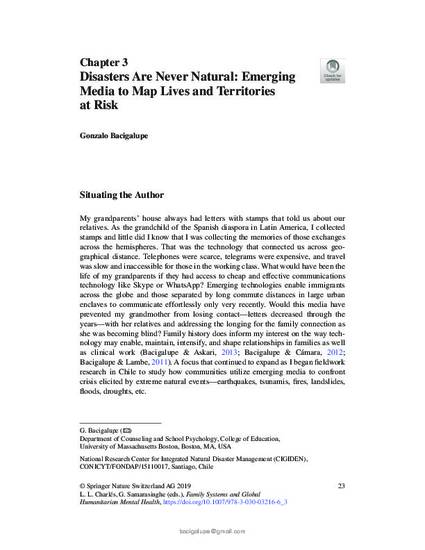
Contribution to Book
Disasters are never natural: Emerging media to map lives and territories at risk
Family systems and global/humanitarian mental health: Approaches in the field
(2019)
Abstract
Disasters are not natural; they occur as communities occupy spaces that are pre- dictably dangerous and exposed to natural and anthropogenic hazards. Societies can invest resources to mitigate and prepare for these extreme events and organize their territories and where people live in ways that place those with the least resources at the most risk. Safe infrastructures, fast response during an emergency, resources for reconstruction, and the ability to create safe spaces are unequally distributed within cities, regions, countries, and the world. Some of the most vulnerable communities live in places that face multiple hazards with few resources to challenge rare but devastating events like fires, landslides, and earthquakes. It is in these territories where collaborative systemic interventions that integrate as many voices as possible are necessary. It is in these places where mental health interventions cannot be iso- lated from urban planning or the strengthening of community resilience.
Keywords
- Disasters,
- participation,
- chile,
- drones,
- community
Publication Date
Spring February 18, 2019
Editor
L. Charles & G. Samarasinge (
Publisher
Springer
ISBN
978-3-030-03215-9
Citation Information
Gonzalo Bacigalupe. "Disasters are never natural: Emerging media to map lives and territories at risk" Family systems and global/humanitarian mental health: Approaches in the field (2019) p. 23 - 33 Available at: http://works.bepress.com/gonzalo_bacigalupe/34/
